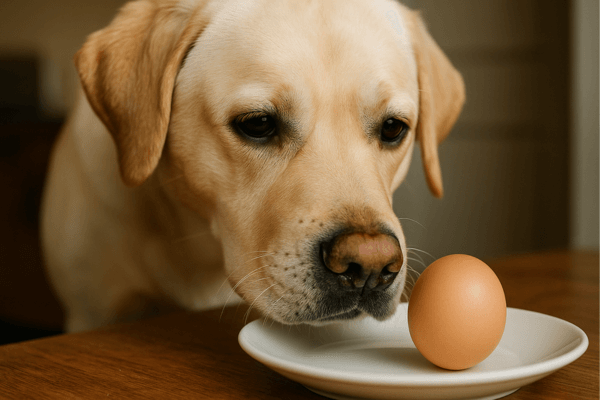Yes, your dog can certainly eat eggs! As a canine nutrition specialist, I get this question quite often, and the answer is reassuringly positive. Eggs are actually a fantastic source of high-quality protein and contain many essential nutrients including vitamin B12, vitamin D and iron.
Cooked versus raw eggs
The safest option is to give your dog cooked eggs. I always recommend this because cooked eggs are easier to digest and eliminate the risk of bacteria such as salmonella. Hard-boiled eggs are perfect – just serve them without salt or any other additives.
Raw eggs are an option too, but they do come with a small risk. Some dog owners swear by them, but personally, I don’t think it’s necessary to take that risk when cooked eggs are just as nutritious.
How to prepare eggs for your dog
The easiest way is to cut a hard-boiled egg into small pieces. This prevents choking, especially in smaller dogs. You can also make scrambled eggs, but without butter, salt or milk – just pure egg in a dry pan.
Just as with certain vegetables, you need to be careful with preparation methods and additives when it comes to eggs.
What to do with eggshells
Whole eggshells aren’t safe because of their sharp edges. However, if you grind them into a powder, you can use them as a calcium supplement. I sometimes do this myself – just pop them in the blender until they become a fine powder.
How many eggs can your dog have
The golden rule here is: everything in moderation. For an average dog weighing 20-25 kilos, one egg per week is plenty. Smaller dogs have enough with half an egg, while larger dogs might handle one and a half to two eggs per week.
I occasionally see owners giving their dogs eggs daily, but that’s really too much. Eggs should be a supplement to their diet, not a replacement for their regular food.
Benefits of eggs for dogs
What I particularly love about eggs is that they contain so many essential amino acids. They’re brilliant for the coat – I really notice this in dogs that regularly get an egg. Their coat becomes shinier and feels softer.
Additionally, eggs contain B vitamins that are good for the nervous system and selenium which supports the immune system. For older dogs who could use some extra nutrition, eggs are a perfect choice.
When not to give eggs
There are a few situations where you should be cautious. Dogs with sensitive stomachs may have trouble with eggs, especially initially. Start with a small piece to see how your dog responds.
Also, dogs that are already overweight shouldn’t have eggs too often. An egg contains about 70 calories, which does count towards their daily total.
Practical tips
What I often do is prepare a batch of hard-boiled eggs that I keep in the fridge. They’ll keep for a few days and are handy for quickly giving a piece as a reward.
You can also mix egg into their regular food if your dog is a bit fussy. Most dogs love the taste, so it can help make their regular food more appealing.
If you’re unsure about quantities or if your dog has special dietary requirements, always discuss it with your vet. They can provide advice that’s specifically tailored to your dog.


